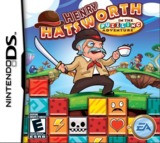It's odd to see a title that entirely relies on conventional video gaming, yet manages to feel fresh.
Henry Hatsworth's charming attitude and personality are mockery of Professor Layton's demeanor, as the game consistently pokes fun at British stereotypes and Layton itself (Hatsworth's sidekick, for example, is very similar to Luke). The plot is as complicated as a 2D platformer's writing can get (very basic); there is a golden suit of clothes scattered around the globe with magical powers, just waiting for a handsome devil to put it on. Hatsworth decides to go out and locate the articles of clothing; alas, British professors tend to be bogged down by sophisticated British noblemen, and the search turns into a race.
Dialogue is humorous and provides for a few laughs, although the annoying Banjo-Kazooie voice acting (gibberish) will get on some player's nerves. The story unfolds through short cutscenes in between levels, which ensures the focus of Hatsworth is the gameplay -- which is a mixed bag.
On the top screen is classic 2D platforming, where the player controls Hatsworth as he lacerates past obstacles while showing off humorous animations and vivid environments. After every 20 or so seconds, the player has to look down to the bottom screen. The touch screen is essentially a watered-down Bejeweled; the player needs to get 3 blocks in a row, but they can only move blocks horizontally. When an enemy on the top screen is killed, it becomes a block on the bottom screen. Blocks appear at the lower half of the touch screen and slowly progress to the top. If an enemy block reaches the edge of the touch screen, it becomes a powerful obstacle on the platforming screen.
The platforming side of Hatsworth is very good, with a plethora of attacks, skills and abilities to enforce the already competent level design. Visuals are decidedly average for a 2D DS game, although in the game's defense it makes good use of colors and character designs are charmingly stereotypical; more importantly, Hatsworth's score is excellent, breathing originality into an experience that heavily relies on conventional methods of play.
Hatsworth's platforming is a bit different than most platformers on Nintendo systems, as it relies more on combat than actual platforming, but those familiar with games such as Castlevania will feel right at home. As opposed to picking up different weapons and abilities, however, Hatsworth's arsenal does not expand but is powered up throughout the game; upgrades can be bought at a shop in between levels. Personally I would have liked to see a larger, more creative arsenal, but what's here is adequate.
What's beyond adequate are Hatsworth's boss battles, which are not only humorous, memorable and creative, but fun to play. Tiburon likely had a lot of laughs coming up with these far fetched scenarios, and whether it be an enraged widow or an operatic pirate, each one is a fantastic conclusion to each world.
Hatsworth boasts an intense level of challenge rarely seen in video games these days, which restricts its audience and really only makes platforming a lesser experience. I'm all for a good challenge, but much of Hatsworth's 'challenge' comes from cheap level design and tricky deaths. Dieing does not necessarily mean you deserved to die.
The puzzling on the bottom is passable, if not as solid as the platforming. It is simple, repetitive and mindless; unfortunately, the player is required to spend an arbitrarily long period of time in the puzzling, and after a few hours it becomes mundane and tiresome to waste so much time in a meaningless mini-game. It also becomes ridiculously easy and isn't very rewarding, which leads to the question of 'what's the point?' Unless you're a fan of overly simplified puzzle games, I can't see the appeal of doing this.
The platforming is not without its pitfalls, either. As I mentioned earlier, cheap deaths are rampant in later levels and cause nothing but frustration. The first few levels are sorely lacking enemy variety, which leads to a rather bland start of an otherwise solid title. Neither the platforming or puzzling in Hatsworth is innovative, creative or masterful.
I really enjoyed Hatsworth, and I reckon most other people will as well. I also predict the punishing difficulty and unremarkable puzzling experience will turn many players off, along with a few minor quirks (such as lack of longevity, enemy variety, etc.). Despite the multitude of irksome issues, however -- all of which are debatable -- Hatsworth proves its worth with strong execution of conventional platforming. It's odd to see a title that entirely relies on conventional video gaming, yet manages to feel fresh; weird.

